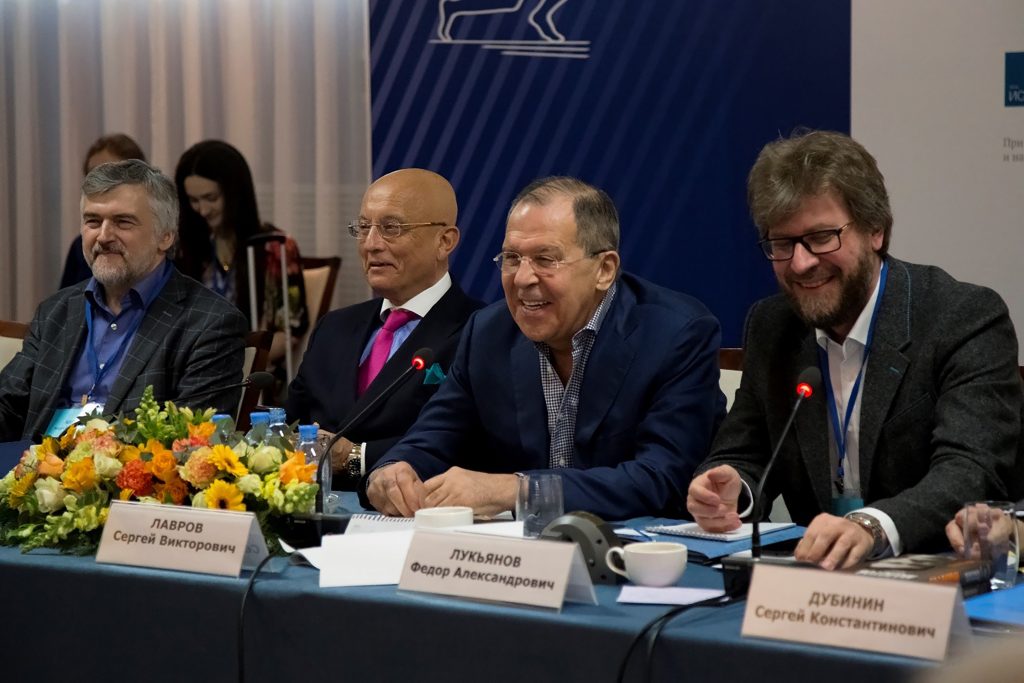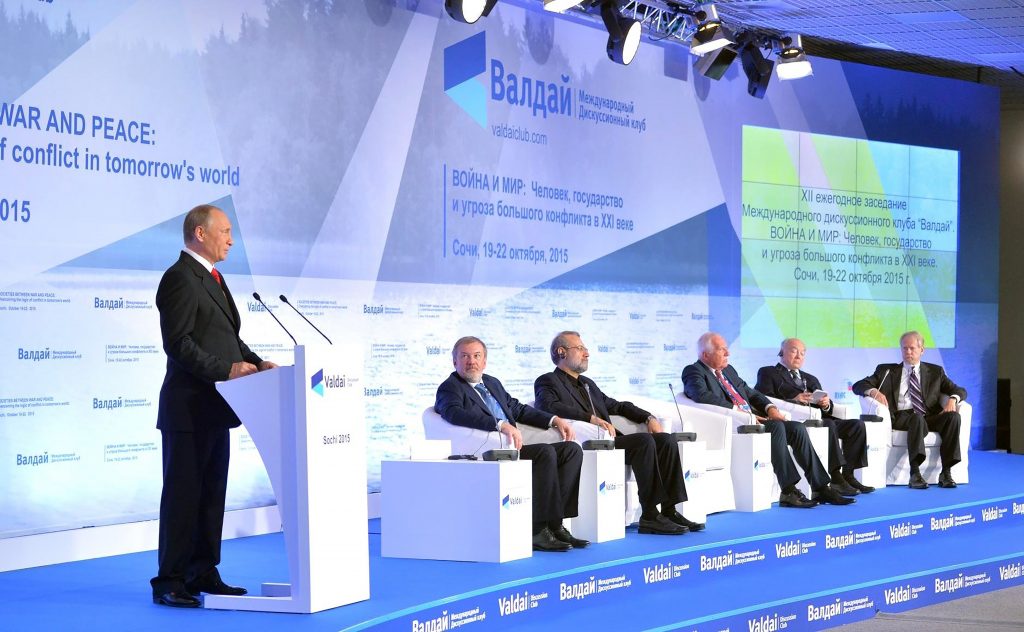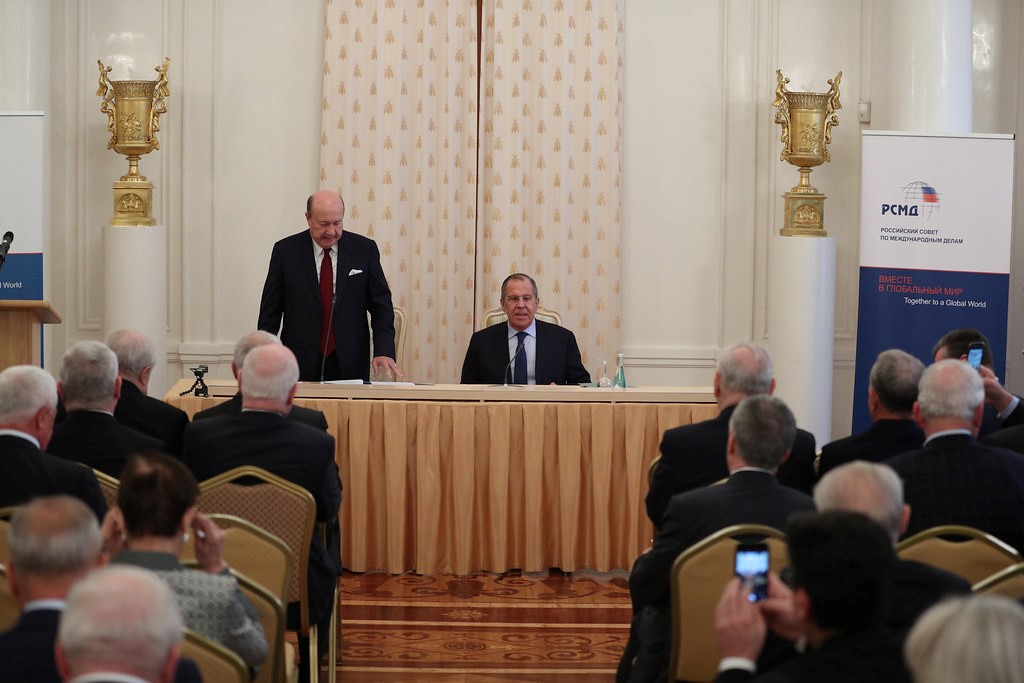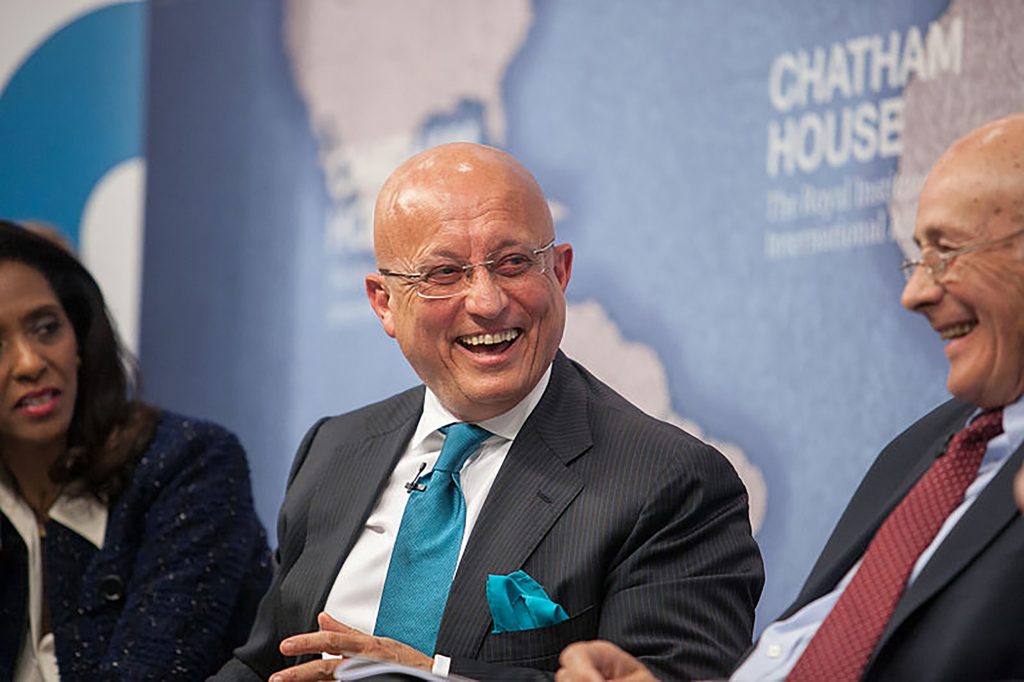In their report for the Atlantic Council, Anton Barbashin and Alexander Graef have examined four main Russian think-tanks and three main Russia's narratives they elaborate. Here we publish an abridged and summarized version showing the key points of their extensive report.
Read also: How pro-Kremlin think tanks spread propaganda in the West
Why only state-sponsored think-tanks remained significant in Russia
Examining the Russian think-tanks, the authors of the research distinguish between three basic institutional forms of such organizations:
- academic and university-based think-tanks,
- private think-tanks,
- state-sponsored think-tanks.
However, only the latter category retains significance in modern Russia.
A heavy blow on the Russian think-tanks which exist as Non-commercial organizations (NCOs) was made by amending Russia's July 2012 NCO law, when the status of “foreign agents” was introduced for those NCOs dealing with political issues in their work and receiving foreign funding. Moreover, since May 2015, the law on undesirable organizations terminated the activities of several foreign donor organizations including the Open Society Foundation, the German Marshall Fund, and the MacArthur Foundation.
As for the academic think-tanks, most of which were funded since the Soviet times, few of them remained influential after an economic crisis in the 1990s. Yet, those few still significant are, once again, dominated by state control because they are located in state universities. One such think-tank is the Moscow State Institute of International Relations (IMI), which is directly subordinated to the Russian Foreign Ministry. Together with the Diplomatic Academy, it is responsible for educating most of the Russian diplomats. Also, they are responsible for executing the annual policy research agenda for the Russian Ministry of Foreign Affairs and for answering ad-hoc inquires of the Ministry.
Russia's four main state-sponsored think-tanks
Since the late 2000s, as the Kremlin’s coffers have grown and officials sought to promote Russian soft power globally, the Russian government started systematic sponsoring of the official foreign policy think tanks and the consolidating the Russian expert community. Organizations sponsored by the political elite are, as a rule, significantly larger than private think-tanks and cover a broad spectrum of policy issues. Sponsorship does not necessarily mean direct funding. Due to the importance of informal political practices in Russia, material and symbolic support can be secured by unofficial relations with major enterprises and political stakeholders.
The four state-sponsored think tanks whose scale, political connections, and financial means allow them to dominate the think-tank scene in Russia are:
- The Council on Foreign and Defense Policy (SVOP)
- The Valdai Discussion Club
- The Russian International Affairs Council (RIAC)
- The Russian Institute for Strategic Studies (RISI).
1. SVOP
As one of the oldest Russian non-governmental organizations, SVOP does not receive financial support from the state but survives on private and commercial donations. Yet SVOP receives symbolic and intellectual state sponsorship, insofar as several members enjoy close relations with the country's top leadership. Among the SVOP members, there are diplomats such as Foreign Minister Sergey Lavrov and several of his deputies; Dmitry Rogozin, the director-general of the Russian state space agency Roscosmos and former deputy prime minister.

SVOP was created in the wake of the failed coup d’état in the Soviet Union in August 1991 by a scholar Karaganov and three officials from the Soviet military. A growing number of SVOP members won it important political positions, particularly after Yeltsin’s reelection in 1996. Gradually, the club’s focus shifted from informing foreigners about Russian politics to promoting distinct Russian views on international affairs.
2. Valdai Discussion Club
Thanks to its annual meetings with Vladimir Putin, the Valdai Discussion Club is arguably Russia’s best-known intellectual brand in international think-tankery. Valdai is formally independent and does not receive direct financial support from the government. Yet the commingling of politics and business in Russia ensures that funding comes from state-owned and large private companies, directly coordinated by the presidential administration. Valdai’s current business partners include the Metalloinvest mining company, owned by Alisher Usmanov; Alfa-Bank Group—Russia’s largest private bank headed by Petr Aven and Mikhail Friedman; and the VTB Group, the leading company in Russia's financial sector.
The Valdai Discussion Club originally emerged from the international conference “Russia at the Turn of the Century: Hopes and Realities,” organized in September 2004 by SVOP and the Russian state news agency RIA Novosti in Veliky Novgorod, near Lake Valdai. The conference culminated in a meeting of thirty-nine participants from Germany, France, and the United Kingdom with Putin at his state residence in Novo-Ogaryovo. After 2009 the club began to supplement its annual autumn meetings with international events on Russian politics and international relations, particularly the meetings were organized in Berlin, Shanghai, Beijing, and Valletta.
The Club was reorganized in 2011-2014. Since then it has been releasing regular reports, the so-called “Valdai Papers,” by Russian and international experts. The scale of annual meetings considerably increased, as the Club tries to show itself not as a mere promotional agency, but as a large think-tank.

3. Russian International Affairs Council
In February 2010, then-President Medvedev issued an order establishing RIAC as a non-commercial partnership under the patronage of the Foreign and Education ministries. RIAC is part of a larger effort to improve Russia’s image abroad and promote Russian perspectives internationally.

RIAC has become the main communication platform for Russian foreign policy experts. RIAC is primarily financed by the state budget via the Foreign Ministry. In the first three years of operation from 2012 to 2014, almost all its spending—more than 95%—came from the state budget, including the federal, regional, and municipal levels. Since 2015, the share of donations from Russian businesses and private citizens, as well as RIAC’s own commercial activities, in its annual expenses has been increasing, and in 2017 accounted for almost one third.
4. Russian Institute for Strategic Studies (RISI)
RISI emerged by presidential decree in February 1992 from the basis of the Scientific Research Institute for Intelligence Problems, which had been part of the counterintelligence arm of the Soviet Committee for State Security (KGB). RISI was established as a new state-sponsored institute, formally independent from the intelligence services.
In April 2009, Medvedev turned RISI into a federal scientific institution financed by the presidential administration, with the president as its founder. Its research activities were tied to the strategy and priorities outlined in the president’s annual address to the Federal Assembly. In 2013-2014 RISI extensively expanded the number of its regional offices. In particular, over the course of 2013, RISI appointed individual representatives in Helsinki, Belgrade, and Warsaw, some of whom have since been expelled from the respective countries.
Leonid Reshetnikov, the head of the Institute, sees Russia as a distinct Christian civilization in an eternal political and cultural struggle against the West, particularly the United States. Under Reshetnikov, RISI actively promoted attempts to intensify the military conflict in eastern Ukraine, aiming at the creation of Novorossiya ("New Russia") as a confederation to extend Russia's control over southeastern Ukraine. Yet, the potential for a local insurgency against the central government in Kyiv had been overstated, contributing, at least from Moscow’s perspective, to a major foreign policy failure.

Three major topics elaborated by Russian foreign policy experts after 2014 and their meaning for the EU and the US
The report by Anton Barbashin and Alexander Graef distinguishes three major themes in the activities of the Russian foreign policy think-tanks:
- First, the breakaway from the concept of Greater Europe where Russia was defined as an integral part of the European world. The opposition to the West, particularly to the US becomes more important, specifically in the context of the Ukrainian conflict, the annexation of Crimea, and the war in the Donbas.
- Second, the establishment of Greater Eurasia narrative and its relation to Russia’s pivot to the East, with a specific focus on Russia-China relations.
- Third, the evolution of the Russian foreign policy community’s attitudes to the concept of multipolarity and current world order.
1. The end of Greater Europe
The term ‘Greater Europe’ refers to the entire geographic space between Iceland and Norway in the North and Türkiye in the South and the space from Portugal in the West to Russia in the East. In the context of Russia foreign policy thinking since the 1980s, it was presumed that this macro-region could be tied together one way or another, not only due to economic, political, and security considerations but also largely to a common cultural and historical closeness.
The cooperation between Russia and EU was developing until 2000s. However, the evolution of Russia’s political system, Putin’s return to the presidency in 2012, and the annexation of Crimea in 2014, constrained considerably the Greater Europe agenda.
The Russian expert community publicly opposes the Western views on the events of 2014. The most exotic take on the roots of the Ukrainian crisis came from RISI under Reshetnikov’s leadership. In an October 2014 report, RISI combined the most dominant conspiratorial views of Western policy toward Ukraine, asserting that the Ukrainian revolution of 2013-2014 was a Western plot aimed at “waging an informational, economic, political, and possibly military assault on Russia.”
Russia’s pushback in Ukraine, according to RISI experts, prevented the creation of a global society of “chipped and nanorobotized transhuman bio-objects, semihuman-semicomputers.”
Even though RIAC and Valdai Club experts do not cite wild conspiracy theories about Ukraine, they do tend to both overlook the fact of Ukraine’s political agency and see the conflict through the prism of post-Cold-War relations between Russia and the West. A September 2014 report by the Valdai Club claimed that Russia annexed Crimea because the Kremlin realized it was being cheated by the West.
2. Greater Eurasia or China’s junior partner?
Upon returning to the presidency in 2012, Putin named the development of Siberia and the Far East as a priority for his new term in office, citing the need to use the opportunities arising from the booming economies of the Pacific to develop Russia’s vast, underpopulated, and fairly poor territories. His call to conceptualize Russia’s development of the Far East was met in the Valdai Club’s 2012 report Toward the Great Ocean, or the New Globalization of Russia. The report rightly said that Russia had missed out on the region’s economic growth because of outdated infrastructure, an underdeveloped economy, and a dire demographic situation. In another report two years later, the authors emphasized the economic motivation of Russia’s pivot to the East, arguing for the need to continually engage a variety of Asian nations in order to integrate Siberia and the Far East into the Pacific economic space.
In SVOP’s foreign policy strategy published in 2015, Karaganov and his co-authors further developed their vision, arguing that the world is moving away from unipolarity through multipolarity toward a soft bipolarity, where the United States and China would be the two main players. The authors predicted that Russia, along with India and Iran, would counterbalance Chinese economic dominance, eventually leading to the creation of Greater Eurasia.

The pivot to the East, by RIAC’s analysis, is inevitable, but must be approached soberly and pragmatically, as China can not entirely substitute cooperation with EU.
As early as 1997, Zbigniew Brzezinski, Professor of American Foreign Policy at Johns Hopkins University, claimed that the possibility of such Eurasian continental block, although not likely at the nearest future, is the greatest danger for the US and should be preempted
Understanding that neither cooperation only with EU nor only with China suffices Russian ambitions, in a 2017 report of the Valdai Club, Karaganov and Bordachev proclaimed that Russia had broken its ideological fixation on the West and embraced a new Central Eurasian or Northern Eurasian identity that “implies moral and political independence from the West, and the strengthening of positions in relations with the West.” Its strategic partnership with China is based on shared responsibilities: Russia takes care of security and China provides economic prosperity. According to the Valdai Club, Russia’s vision of Greater Eurasia is consistent with China’s One Belt One Road (OBOR) initiative.
Among the Valdai Club’s concrete proposals to institutionalize these efforts were the development of a common Greater Eurasia logistics strategy; investments in financial infrastructure, including de-dollarization and an alternative to Society for Worldwide Interbank Financial Telecommunications (SWIFT); and the creation of a Eurasian mega-media vision and projects that would combine features of the BBC and Stratfor. The authors of the Valdai Club’s report recognized that Russia had already become a “de-facto military-political ally of China.”

3. Multipolarity and world order
Since the 1990s Russia is advocating a multipolarity world model that implies that other centers of power should develop to counterweight the US and, also, that Russia should become one of such centers.
In one of RISI’s analyses, the coming multipolarity is explained through the prism of military interventions and the end of the “unchecked expansion of Western institutions.” Russia’s interventions in Ukraine and Syria are held as proof that the United States can no longer advance its foreign policy goals without taking into account the opinion of other great powers.
The multipolar world is the world of strong military powers that have their spheres of influence and regulate global affairs by striking deals with other great powers. Of course, this approach disregards international law or the rights of “smaller nations” since they lack adequate military might and/or what the Kremlin calls “sovereignty.” Putin often emphasizes that despite the fact that he favors the cooperation with states of Greater Asia, no part of Russia's "sovereignty" should be shared:
“Russia is fortunately not a member of any alliance. This is also a guarantee of our sovereignty. Any nation that is part of an alliance gives up part of its sovereignty.”
The conflicting nature of such statements combined with the almost axiomatic belief in the coming age of multipolarity creates a contradictory depiction of multipolarity in much of Russia’s foreign policy analysis. What does Eurasian integration mean to Russia if sovereignty cannot be shared even with the closest allies?
Read also:
- “An Unfounded Foundation”: How Russian-run fake Western thinktanks look like
- How pro-Kremlin think tanks spread propaganda in the West
- Russian propaganda around annexation of Crimea doesn’t stop
- A guide to Russian propaganda
- Revision of History: How Russian historical propaganda justifies occupation of entire south-eastern Ukraine
- The Soviet foundations of Russia’s Great Patriotic War myth
- Top-6 Soviet World War II myths used by Russia today
- “Our disagreement with leadership’s pro-Kremlin tendencies ignored”: Ukrainian scholars on closure of Kennan Institute Kyiv office
- Democracies should prepare for the long fight against Russian disinformation warfare: study
- The Kremlin’s chaos strategy in Ukraine and its helpers
- Academia again serves state ideology as Russia convicts Ukrainian library head
- How Russia infiltrates the media landscape of the Black Sea region
- How the Kremlin influences the West using Russian criminal groups in Europe
- Moscow has complex system to run agents of influence abroad, Khmelnytskyi says

